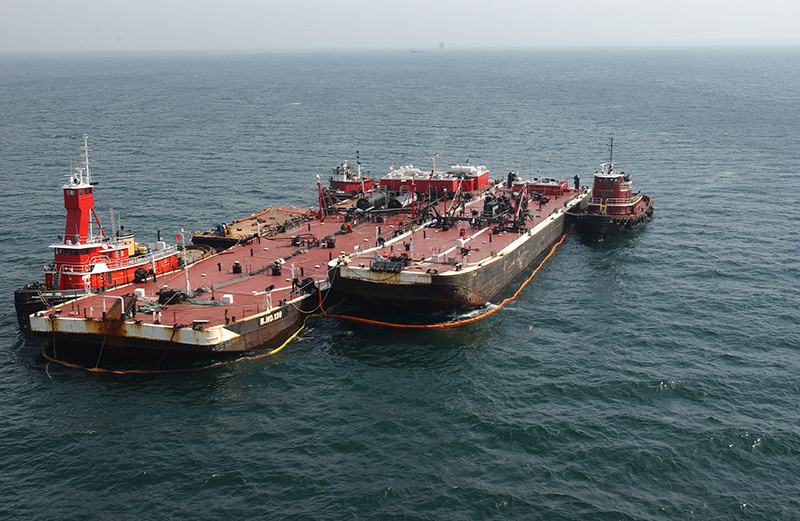More than 14 years after a barge grounding spilled 98,000 gals. of fuel oil into Buzzards Bay, operator Bouchard Transportation Co. Inc. has agreed to pay an additional $13 million in damages to federal and state agencies in Massachusetts and Rhode Island.
The pending settlement would raise the overall price tag for the April 27, 2003, accident above $40 million – underscoring the risk that drives the maritime transport industry and its regulators to ramp up safety efforts.
The Melville, N.Y., based Bouchard company was delivering more than four million gals. of No. 6 fuel oil from Philadelphia to Sandwich, Mass., on its tank barge B. No. 120, towed by the 114.5'x31'x12.8', 3,900-hp tugboat Evening Tide, when the barge grounded on a shoal in the western approach to Buzzards Bay.
A hull rupture released up to 98,000 gals of oil, and over the following weeks biologists estimated thousands of birds died as a result, according to the U.S Fish & Wildlife Service, one of the parties to the settlement. FWS and state wildlife officials said the after-effects of the spill including fouled shorelines affected the breeding success of many shorebird species, reducing their future populations by thousands of animals.
The spill kicked off a push by state officials to assert more control over oil shipments in Buzzards Bay – and struggles with federal authorities and the industry that have continued for years.
In 2004 Massachusetts lawmakers passed a measure that among other things would require escort tugs to accompany all single- and double-hull oil barges transiting Buzzards Bay. The federal government went to court, challenging what it viewed as a state usurpation of federal authority over maritime trade, as did industry advocates. Even today barge operators, politicians, environmental groups and the Coast Guard are at odds over the safety of fuel transport through the bay, despite the federal Oil Pollution Act of 1990 (OPA 90) now requiring all double hulls in the U.S. oil trade.
The new settlement agreement would add to the millions of dollars already levied in earlier settlements related to the 2003 accident. In a previous natural resources damage claim, Bouchard paid more than $6 million in 2010, on top of a $10 million fine to settle federal criminal liability for violating the Clean Water Act and the Migratory Bird Treaty Act. In 2005 court proceedings, the tugboat mate entered a guilty plea to misdemeanor charges on those counts, after federal prosecutors said he had left the wheelhouse to work at the stern of the tug, and missed a radio warning from a nearby vessel that the tow was heading out of the channel.
Private property owners on Buzzards Bay won an $11.45 million settlement that year, apportioned among 700 plaintiffs in a class-action lawsuit after $3.8 million for attorney fees.
If the new settlement is approved by the court, the agencies will use the money to develop projects for restoring “populations of affected bird species to what they would have been if the spill had not occurred,” according to the FWS statement.
Money from the 2010 settlement was used for a variety of environmental projects with the states, towns and local conservation groups. Those included protecting 450 acres of shoreline in Fairhaven and Mattapoisett, Mass., shellfish restoration projects in nine towns, and managing piping plover nesting areas to increase the birds’ breeding success. Parks and public access improvements around the bay area were also paid for with settlement funds.





